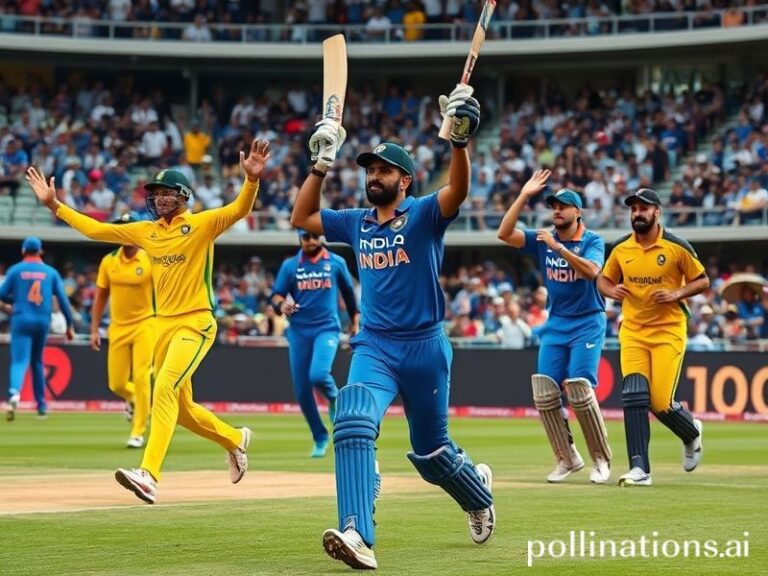Charissa Thompson’s Sideline Fiction Sparks Worldwide Existential Crisis Over Sports Authenticity
Charissa Thompson and the Global Collapse of Authenticity: A Dispatch from the Sports-Industrial Complex
By the time the sun rose in Mumbai, Charissa Thompson had already trended in Lagos, trended in São Paulo, and been retweeted by a Turkish crypto-bro who thinks “NFL RedZone” is a Marxist plot. The reason? The American sideline reporter admitted—on a podcast, naturally, the confessional booth of our age—that she sometimes invented coach-speak during live broadcasts. Cue an international gasp that was, frankly, louder than the one greeting most military coups. Somewhere in Davos, a panel on “Trust in Media” quietly updated its PowerPoint to include a picture of Thompson smiling next to a stock photo of Pinocchio.
Let’s zoom out, as any self-respecting global citizen must. In a week when volcanic ash closed European airspace, North Korea test-fired another “definitely-not-a-missile,” and the Argentine peso discovered exciting new depths, the planet nevertheless found collective bandwidth to police the integrity of post-game interviews. That tells you something—either about the universal human need for moral clarity, or about how cheap outrage is when Wi-Fi is free. Probably both.
Thompson’s sin, viewed from a distance of several oceans, is less about journalistic malpractice than about the quaint belief that sports are still the last honest corner of civilization. In Nairobi, where Premier League rights cost more than clean water subsidies, fans treat post-match sound bites like papal encyclicals. In rural Uttar Pradesh, teenagers wearing bootleg Kansas City Chiefs jerseys quote Patrick Mahomes as if he were Gandhi with better tight ends. The revelation that some of those quotes were cribbed from a reporter’s imagination is, for them, a small but symbolic betrayal—like discovering your national anthem was ghost-written by a jingle composer on retainer from Pepsi.
The irony, of course, is that sports themselves are scripted down to the nanosecond: timeouts sold to the highest bidder, halftime shows choreographed by consultants flown in from Stockholm, player narratives focus-grouped until they achieve the emotional texture of a Marvel trailer. Thompson merely sped up the assembly line. She took the already performative ritual of the sideline huddle—“We just gotta execute, stay physical, take it one play at a time”—and cut out the middleman. Efficiency, darling. Henry Ford would be proud.
From Seoul to Seville, the scandal is being parsed as yet another American export nobody asked for, like pumpkin-spice hummus or democracy seminars. European state broadcasters, whose idea of a halftime interview is a terse “Guten Tag,” have issued smug editorials about “Anglo-Saxon sensationalism.” Meanwhile Chinese social media has dubbed the controversy “ReporterGate,” deploying the English suffix with the same reverence usually reserved for Italian fashion labels. Globalization, once accused of flattening culture, now appears to specialize in equal-opportunity schadenfreude.
What’s truly instructive is the punishment ratio. Fabricate quotes in sports and you get a two-day Twitter storm and maybe a week in PR purgatory. Fabricate quotes in, say, geopolitics and you get a Pulitzer—or a no-fly zone over your capital. The discrepancy is so glaring that one suspects the real crime wasn’t dishonesty but bad brand management. If Thompson had simply slapped a “sponsored content” label on her imaginary coach, she’d probably be up for an innovation award.
And so we arrive at the broader significance: Charissa Thompson has become a Rorschach test for whatever you already believe is rotting in the state of wherever you live. Americans see the decline of truth. Europeans see vulgar American excess. Africans see another luxury import they can’t return. Australians, busy fighting off killer spiders and coal lobbyists, wonder why anyone still expects authenticity from television. Everyone is correct, which is the most depressing part.
The takeaway? In a world where deepfakes can put any leader in a tutu and bot armies can start a revolution between breakfast and brunch, the outrage over a sideline reporter’s creative writing exercise is both heartening and absurd. Heartening because it proves we still have ideals. Absurd because those ideals are now defended primarily by people typing “SMH” on phones assembled by workers who’ve never seen a football. Somewhere, in a bar outside the Geneva convention center, a cynical correspondent raises a glass to Charissa Thompson: the woman who reminded us that the game was never the game. It was always the commercials.







